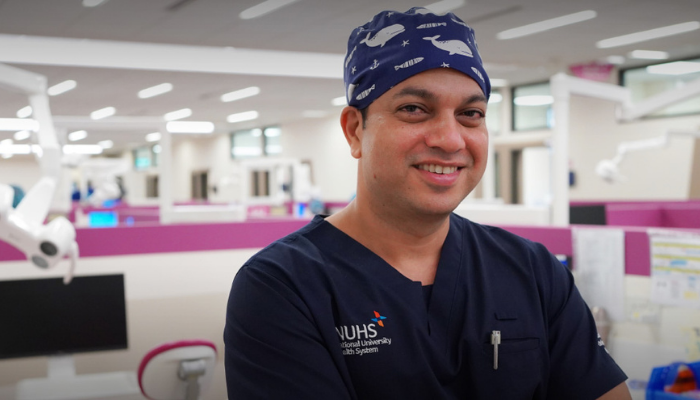Published on 16 October 2021
With fewer than a hundred practicing specialists across Singapore, the oral and maxillofacial surgery (OMS) specialty is one of the lesser-known in the local dental fraternity.
Unlike conventional dentistry, OMS specialists do not do procedures like scaling and fillings. Instead, they straddle the fields of dentistry and medicine, treating issues beyond just the teeth and gums – such as facial injuries, jaw abnormalities, cancer of the head and neck, and even cleft palates.
“We are people who dentists look at and say, you’re not really a dentist. And medical doctors look at us like, you’re not really a medical doctor either. We are neither here nor there,” quipped Dr Intekhab Islam, an OMS surgeon from the National University Centre for Oral Health, Singapore (NUCOHS). Also a lecturer at the National University of Singapore’s faculty of dentistry, Dr Intekhab has been working in the field for fifteen years.

Work as an OMS surgeon includes both clinical work as well as surgery. A typical day, said Dr Intekhab, starts with rounds in the hospital ward, so he can check on his inpatients. Clinics come after, during which he sees patients who can be treated in a dental chair. In addition, he spends three days a week in surgery.
The unusually heavy focus on surgery is what sets OMS apart in the dental field. In fact, while in Singapore it is categorised as a dental specialty, OMS is considered a surgical specialty in countries such as the UK, US and Germany. In these countries, OMS practitioners are required to be doubly qualified – which means they must be qualified in both medicine and dentistry.
In Singapore, the majority of OMS specialists are singly-qualified, with just three doubly-qualified specialists across the National University Health System (NUHS). But there is a growing trend towards double qualification. “It’s changing,” said Dr Intekhab. “There’s been a bit of a shift between what we used to do and what we’re doing now.”
Best of both worlds
Asst Prof John Loh is one of the three members of this rarefied group. After graduating from dental school and doing his master’s degree in OMS in Hong Kong, he worked for a few years as a registrar here before jetting off to London for medical school.
Having spent well over a decade in training and education, Asst Prof Loh is now an OMS surgeon and an oncology surgeon, with a joint appointment as Consultant in both NUCOHS and the National University Cancer Institute, Singapore (NCIS), where he treats cancers of the head and neck.
What drew him to this unusual path was his twin interests in OMS and oncology. “I knew I wanted to do OMS since my first year of dental school, when I first stepped into an operating theatre,” he said. “I was drawn to the idea of surgery from the very start.”
“But I was also drawn to oncology. I like the science of it, the work involved, the patient journey- the patient journey is the most important to me.”
And while he calls his stint in medical school “time well spent”, Asst Prof Loh believes that there is more to credentials in being a good surgeon.
“More knowledge is always helpful,” he acquiesced. “But even though it’s important to be well trained, with surgical skills and clinical finesse, that’s not what makes a good surgeon.
“Rather, it’s about being passionate, but also having the heart for the patient.”
As to whether he believes doubly-qualified physicians are the future of OMS, Asst Prof Loh firmly believes that there is a place for the both singly- and doubly-qualified in the local ecosystem.
Part of this, he added, is because of Singapore’s own miniature population.
“Having only doubly-qualified surgeons in countries like the UK and the US makes sense, because they have a lot of cancer patients,” he said.
“But we don’t have enough cancer patients for these economies of scale. So we’re not bound to a dental chair, we go to wards and see patients, we handle cancers and sometimes do long, twelve-hour surgeries….but we also do things like wisdom teeth, extractions, biopsies, and cysts.
“Everyone has a place in the future,” he concluded.
A heart for the patient
Despite their different backgrounds, both Asst Prof Loh and Dr Intekhab agree that patients are at the centre of what they do.
“Every patient brings with them their own challenges and they are all very, very unique,” said Dr Intekhab.
He shared a particularly memorable incident on a mission trip, when he operated on a young boy with a cleft lip. “This was maybe 15 years ago, and I still remember the look on [his mother’s] face,” he shared.
For Asst Prof Loh, interacting with patients is also a “humbling” experience. “When I talk to the patient, I remember how finite we are as surgeons,” he said. “When you watch shows like Grey’s Anatomy, the picture of a surgeon is someone who is loud, brash, confident…but I believe a good surgeon is one who truly cares about the patient.”
Asst Prof Loh added that he makes a point to ask about his patients’ families. “I even remember their grandchildren’s names,” he said. “It’s so I can motivate them, especially with our cancer patients. So I can tell them, ‘you need to be well so you can go home to so-and-so’.”
Perhaps as a result of their time spent in the operating theatre, the OMS specialty is also a particularly close one – one that Dr Intekhab quips resembles “a gang”.
And the sense of camaraderie – the esprit de corps, as Asst Prof Loh puts it – is just as well, considering how important teamwork is to surgical work.
“It’s not like in the middle of a surgery, you can just go off on your own,” he said.
“In the operating theatre...we just hang on together.”
In consultation with Dr Intekhab Islam, Senior Consultant, Discipline of Oral & Maxillofacial Surgery, NUCOHS & Senior Lecturer, Oral and Maxillofacial Surgery, Faculty of Dentistry, NUS; Asst Prof John Loh Ser Pheng, Consultant, Discipline of Oral & Maxillofacial Surgery, NUCOHS




